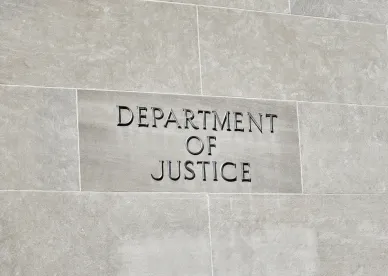Earlier this year, the Assistant Attorney General for the National Security Division publicly confirmed the Department of Justice’s (“DOJ”) intention to make Foreign Agents Registration Act (“FARA”) a criminal enforcement priority. This newfound priority has resulted in surge of FARA prosecutions — including the cases against Paul Manafort, Michael Flynn and Greg Craig — with no sign of slowing down.
FARA, which was originally enacted in 1938 to combat Nazi propaganda, is a disclosure statute that requires persons acting as agents of foreign principals in a political or quasi-political capacity to make periodic public disclosure of their relationship with the foreign principal, as well as activities, receipts and disbursements in support of those activities. Failure to register with the DOJ can result in criminal penalties — fines up to $10,000 and up to five years’ imprisonment — or civil enforcement enjoining a party from acting as an agent of a foreign principle.
Despite the seriousness of FARA’s penalties, it has long been an afterthought because of federal prosecutors’ hesitancy in bringing FARA prosecutions.1 DOJ brought only seven criminal FARA cases between 1966 and 2015 (securing FARA convictions in just three cases) and had not employed FARA’s civil injunctive relief since 1991. In the last three years, however, there has been a significant uptick in the number of FARA prosecutions. The influx of FARA prosecutions is consistent with the DOJ’s recent public avowals to prioritize FARA enforcement. Congress has also given extra attention to FARA, as over a dozen bills related to FARA were introduced in the last session, most of which seek to eliminate statutory exemptions and give additional powers and resources for investigating potential violations and increased enforcement.
Because of FARA’s startlingly broad language, the new enforcement priority creates compliance challenges and enforcement risks for companies that have international business operations or otherwise deal with foreign governments and firms. Nevertheless, companies may be released from FARA’s onerous disclosure requirements if it meets one of the various statutory exemptions. Widely used exemptions include the Bona Fide Commerce Exemption, Lawyer Exemption and Lobbying Disclosure Act Exemption. Companies seeking to avail themselves of such protections should be wary, however, as FARA’s statutory exemptions are not well defined and case law and DOJ guidance on as much is sparse.
Interested readers are encouraged to check back for a future e-alert on FARA compliance.
For further reading on the topic:
DOJ’s FARA webpage, available at https://www.justice.gov/nsd-fara
DOJ’s FARA Advisory Opinions, available at https://www.justice.gov/nsd-fara/advisory-opinions
OIG’s Audit of the National Security Division’s Enforcement and Administration of the Foreign Agents Registration Act, available at https://oig.justice.gov/reports/2016/a1624.pdf





 />i
/>i

